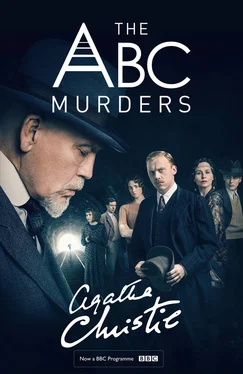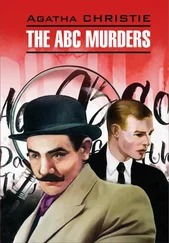The sordid crime took on a new aspect.
Who was the mysterious individual who had killed Mrs Ascher and left an A B C railway guide behind him?
When we left the police station our first visit was to the mortuary to see the body of the dead woman. A strange feeling came over me as I gazed down on that wrinkled old face with the scanty grey hair drawn back tightly from the temples. It looked so peaceful, so incredibly remote from violence.
‘Never knew who or what struck her,’ observed the sergeant. ‘That’s what Dr Kerr says. I’m glad it was that way, poor old soul. A decent woman she was.’
‘She must have been beautiful once,’ said Poirot.
‘Really?’ I murmured incredulously.
‘But yes, look at the line of the jaw, the bones, the moulding of the head.’
He sighed as he replaced the sheet and we left the mortuary.
Our next move was a brief interview with the police surgeon.
Dr Kerr was a competent-looking middle-aged man. He spoke briskly and with decision.
‘The weapon wasn’t found,’ he said. ‘Impossible to say what it may have been. A weighted stick, a club, a form of sandbag—any of those would fit the case.’
‘Would much force be needed to strike such a blow?’
The doctor shot a keen glance at Poirot.
‘Meaning, I suppose, could a shaky old man of seventy do it? Oh, yes, it’s perfectly possible—given sufficient weight in the head of the weapon, quite a feeble person could achieve the desired result.’
‘Then the murderer could just as well be a woman as a man?’
The suggestion took the doctor somewhat aback.
‘A woman, eh? Well, I confess it never occurred to me to connect a woman with this type of crime. But of course it’s possible—perfectly possible. Only, psychologically speaking, I shouldn’t say this was a woman’s crime.’
Poirot nodded his head in eager agreement.
‘Perfectly, perfectly. On the face of it, highly improbable. But one must take all possibilities into account. The body was lying—how?’
The doctor gave us a careful description of the position of the victim. It was his opinion that she had been standing with her back to the counter (and therefore to her assailant) when the blow had been struck. She had slipped down in a heap behind the counter quite out of sight of anyone entering the shop casually.
When we had thanked Dr Kerr and taken our leave, Poirot said:
‘You perceive, Hastings, that we have already one further point in favour of Ascher’s innocence. If he had been abusing his wife and threatening her, she would have been facing him over the counter. Instead she had her back to her assailant—obviously she is reaching down tobacco or cigarettes for a customer.’
I gave a little shiver.
‘Pretty gruesome.’
Poirot shook his head gravely.
‘Pauvre femme,’ he murmured.
Then he glanced at his watch.
‘Overton is not, I think, many miles from here. Shall we run over there and have an interview with the niece of the dead woman?’
‘Surely you will go first to the shop where the crime took place?’
‘I prefer to do that later. I have a reason.’
He did not explain further, and a few minutes later we were driving on the London road in the direction of Overton.
The address which the inspector had given us was that of a good-sized house about a mile on the London side of the village.
Our ring at the bell was answered by a pretty dark-haired girl whose eyes were red with recent weeping.
Poirot said gently:
‘Ah! I think it is you who are Miss Mary Drower, the parlourmaid here?’
‘Yes, sir, that’s right. I’m Mary, sir.’
‘Then perhaps I can talk to you for a few minutes if your mistress will not object. It is about your aunt, Mrs Ascher.’
‘The mistress is out, sir. She wouldn’t mind, I’m sure, if you came in here.’
She opened the door of a small morning-room. We entered and Poirot, seating himself on a chair by the window, looked up keenly into the girl’s face.
‘You have heard of your aunt’s death, of course?’
The girl nodded, tears coming once more into her eyes.
‘This morning, sir. The police came over. Oh! it’s terrible! Poor auntie! Such a hard life as she’d had, too. And now this—it’s too awful.’
‘The police did not suggest your returning to Andover?’
‘They said I must come to the inquest—that’s on Monday, sir. But I’ve nowhere to go there—I couldn’t fancy being over the shop—now—and what with the housemaid being away, I didn’t want to put the mistress out more than may be.’
‘You were fond of your aunt, Mary?’ said Poirot gently.
‘Indeed I was, sir. Very good she’s been to me always, auntie has. I went to her in London when I was eleven years old, after mother died. I started in service when I was sixteen, but I usually went along to auntie’s on my day out. A lot of trouble she went through with that German fellow. “My old devil,” she used to call him. He’d never let her be in peace anywhere. Sponging, cadging old beast.’
The girl spoke with vehemence.
‘Your aunt never thought of freeing herself by legal means from this persecution?’
‘Well, you see, he was her husband, sir, you couldn’t get away from that.’
The girl spoke simply but with finality.
‘Tell me, Mary, he threatened her, did he not?’
‘Oh, yes, sir, it was awful the things he used to say. That he’d cut her throat, and such like. Cursing and swearing too—both in German and in English. And yet auntie says he was a fine handsome figure of a man when she married him. It’s dreadful to think, sir, what people come to.’
‘Yes, indeed. And so, I suppose, Mary, having actually heard these threats, you were not so very surprised when you learnt what had happened?’
‘Oh, but I was, sir. You see, sir, I never thought for one moment that he meant it. I thought it was just nasty talk and nothing more to it. And it isn’t as though auntie was afraid of him. Why, I’ve seen him slink away like a dog with its tail between its legs when she turned on him. He was afraid of her if you like.’
‘And yet she gave him money?’
‘Well, he was her husband, you see, sir.’
‘Yes, so you said before.’ He paused for a minute or two. Then he said: ‘Suppose that, after all, he did not kill her.’
‘Didn’t kill her?’
She stared.
‘That is what I said. Supposing someone else killed her…Have you any idea who that someone else could be?’
She stared at him with even more amazement.
‘I’ve no idea, sir. It doesn’t seem likely, though, does it?’
‘There was no one your aunt was afraid of?’
Mary shook her head.
‘Auntie wasn’t afraid of people. She’d a sharp tongue and she’d stand up to anybody.’
‘You never heard her mention anyone who had a grudge against her?’
‘No, indeed, sir.’
‘Did she ever get anonymous letters?’
‘What kind of letters did you say, sir?’
‘Letters that weren’t signed—or only signed by something like A B C.’ He watched her narrowly, but plainly she was at a loss. She shook her head wonderingly.
‘Has your aunt any relations except you?’
‘Not now, sir. One of ten she was, but only three lived to grow up. My Uncle Tom was killed in the war, and my Uncle Harry went to South America and no one’s heard of him since, and mother’s dead, of course, so there’s only me.’
‘Had your aunt any savings? Any money put by?’
‘She’d a little in the Savings Bank, sir—enough to bury her proper, that’s what she always said. Otherwise she didn’t more than just make ends meet—what with her old devil and all.’
Читать дальше












